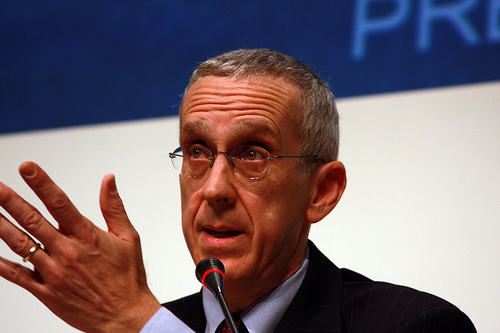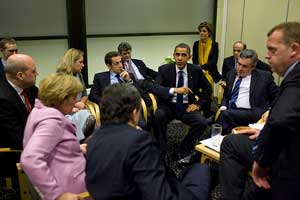
Photo courtesy of US Department of State, via <a href="http://www.flickr.com/photos/statephotos/4176289409/">Flickr</a>.
The agreement reached at the Copenhagen summit last month might not have been the successful deal on climate that many had hoped for. But it was a victory in the sense that the climate talks “came within a hair’s breadth of collapse,” climate envoy Todd Stern said on Thursday.
In his first public remarks since the conclusion of the summit, Stern said that late as Wednesday evening, “it looked as though we were headed for failure.” It was apparently so bad that the State Department drafted a failure speech for President Obama to use on the final day, as fellow negotiator Jonathan Pershing noted earlier this week. Stern described a meeting starting at 11:30 on Thursday night—literally the 11th hour, as the summit was supposed to conclude on Friday—between Secretary of State Hillary Clinton, British Prime Minister Gordon Brown, German Chancellor Angela Merkel, Australian Prime Minster Kevin Rudd, Mexican President Felipe Calderone, South African President Jacob Zuma, Brazilian President Luiz Lula da Silva, and others “sitting around a table and trying to not let this negotiation go down.” The leaders adjourned at 2:30 a.m. without reaching any significant breakthrough.
In the conference’s final hours, leaders were “personally rolling up their sleeves and taking over the process of negotiation,” Stern said. “It was just really a refusal on the part of these leaders to have a non-result.” But there was little progress until the final, “fairly dramatic” meeting between Obama, China, India, South Africa, and Brazil late on Friday night, he said. Stern played up Obama’s personal participation in those final meetings. “I don’t think there would have been an agreement without his personal intervention,” he said. (Stern cited this intervention as evidence of Obama’s commitment to the issue domestically as well, promising a “significant effort on the part of all in the administration to press forward.”)
Of course, those final meetings at Copenhagen prompted some developing countries to charge that the final deal was shoved on them—which is why the assembled nations merely “noted” the accord rather than formally adopted it. Stern said it will become evident in the next few weeks whether or not Copenhagen really acheived anything meaningful, as countries are expected to sign on to the final document and list their respective commitments by Jan. 31. “The accord is lumbering down the runway,” Stern concluded. “We need to get enough speed for it to take off.”















